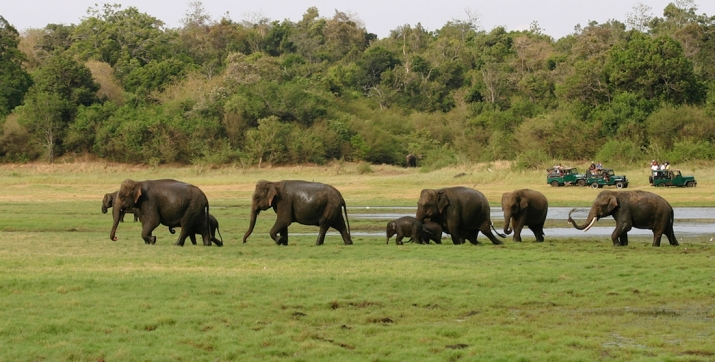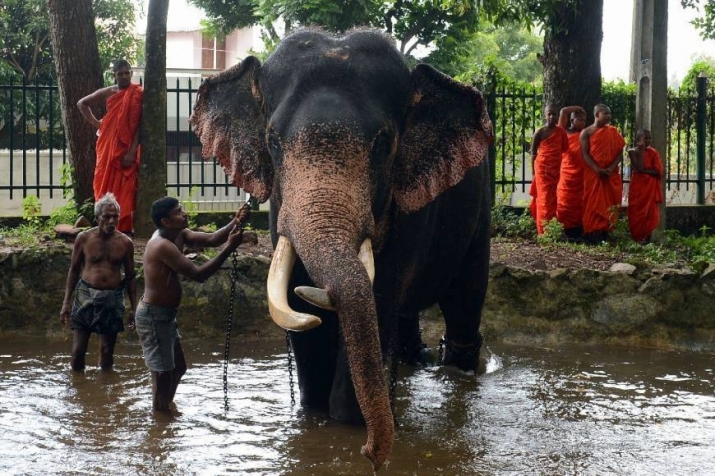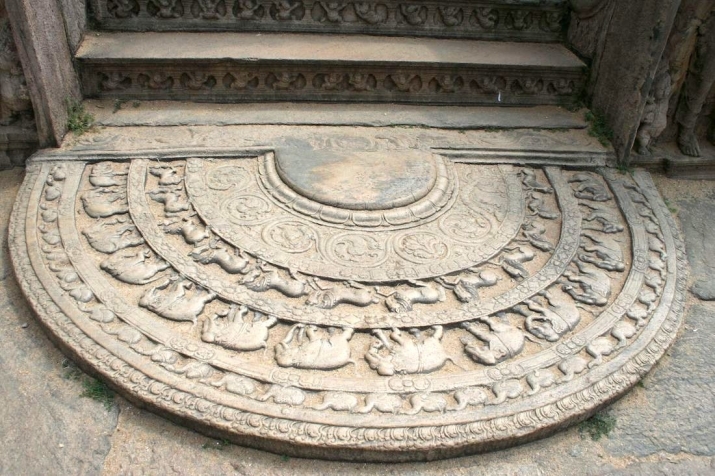NEWS
Sri Lanka Clamps Down on Illegal Ownership of Wild Elephants
 A herd of wild elephants roam in Sri Lanka's Wasgamuwa Safari Park. From bestoflanka.com
A herd of wild elephants roam in Sri Lanka's Wasgamuwa Safari Park. From bestoflanka.comGovernment authorities in Sri Lanka have launched a crackdown on owners of wild elephants, enforcing a decades-long ban that has not always been rigorously applied throughout its history.
Elephant ownership has long been a symbol of prestige and status among Sri Lanka’s wealthy, and a traditional feature of religious ceremonies in this predominantly Buddhist country. Even though it is illegal to possess elephants without a government permit, at least 40 elephants have been abducted from the island's national parks in the last decade, according to Sri Lankan authorities.
Animal welfare and conservation activists say that capturing baby elephants in the wild often results in the death of the calf’s mother. “The maternal instinct in elephants is very, very strong. Poachers can’t get at a baby without the mother putting up a fight, and it usually ends with the death of the mother,” said Asian elephant expert Jayantha Jayewardene, adding that guns were often used to scare the mothers away from their young, and sometimes to kill them. (The Japan Times)
Elephants have also been a prominent symbol in Buddhism since the very beginning: accounts of the historical Buddha’s life relate how his mother dreamed of a white elephant before giving birth to the aspirant Buddha. In a later incident, when two factions of monks became embroiled in a heated argument,* the Buddha, exasperated with their quarreling, went into solitary retreat in the forest, where it is said he received sustenance and protection from a monkey and an elephant. Elephants also feature heavily in Theravada Buddhist art, in particular the famous moonstone (andakada pahana) in Sri Lanka—a unique feature of ancient Sinhalese architecture that takes form of a carved semi-circular stone slab, usually found at the bottom of doorways and staircases. Tamed wild elephants can also found in many Buddhist monasteries on the island, where they have played a key role in religious processions for centuries.
 Mahouts bathe an elephant at a monastery. From japantimes.co.jp
Mahouts bathe an elephant at a monastery. From japantimes.co.jpHowever, for the last two years, Sri Lanka’s government has been cracking down on illegal elephant ownership, whether obtained for private or religious purposes. According to government records, there should be only 127 elephants in captivity. Wildlife minister Gamini Jayawickrama Perera said the government has so far confiscated 39 elephants obtained illegally, bought for as much as US$200,000 during the previous government. Among those facing prosecution for illegally possessing elephants are a judge and a Buddhist monk.
Perera has informed the Sri Lankan parliament that he is determined to bring a stop the lucrative illegal trade. Recognizing the demand for elephants in religious processions, the government is planning to set up a pool of elephants that can be loaned to temples. “We have to create a pool
of elephants for processions,” said Perera. “We are creating a process now for how to issue
permits . . .”
There are about 30,000 Buddhist monasteries in Sri Lanka and it is impossible for each monastery to possess an elephant, said Prithviraj Fernando, who runs the Centre for Conservation and Research in Sri Lanka, noting, “Taming a wild elephant is an extremely cruel experience for the animal. Whether it’s a temple or a private person, that’s how it is done.” (The Washington Post)
Not all Sri Lankans welcome the government’s strict new measures, however, especially among the majority Buddhist population. Venerable Magalkande Sudantha, a Buddhist monk, noted that the number of elephants included in religious precessions was a traditional measure of their success. Kanthi Sriyalatha, a 53-year-old housewife, agreed, saying elephants were very fortunate to be given an opportunity to carry sacred Buddhist relics from temples during the processions. Harsha Dharmawijaya, meanwhile, whose family has own elephants for 96 years, insisted that domesticated elephants enjoy happier lives than those in the wild as they are provided with baths, good food, and medical treatment when they are sick.
 Elephants in relief on a moonstone in the city of Anuradhapura. From fivepacksoneworld.wordpress.com
Elephants in relief on a moonstone in the city of Anuradhapura. From fivepacksoneworld.wordpress.comCritics of tradition are equally vocal. Sumith Pilapitiya, a former World Bank environmental specialist, argued that it is wrong to ill-treat animals in the name of Buddhism: “If the Buddha was alive, would he condone what’s going on?” he asked. “In the name of Buddhism . . . we are ill-treating animals.” (The Washington Post)
A census conducted by the Sri Lanka Wildlife Conservation Department in 2011 put the population of wild elephants in Sri Lanka at 7,379, higher than its earlier estimate of some 5,350. However, government officials say nearly 200 elephants are killed every year when they intrude into human-inhabited areas.
* The Honey-offering Festival: Commemorating the Service of Animals to the Buddha (Buddhistdoor Global)
See more
Sri Lanka cracks down on owners of elephants taken from wild (The Washington Post)
Baby elephants become latest status symbol among Sri Lanka’s rich (The Japan Times)
CID says baby elephant not registered under Ven. Dhammaloka Thera's name (Daily News)
Sri Lankan elephant numbers 'healthy', survey suggests (BBC)
Related
Do Animals Grieve? (Buddhistdoor Global)
World’s Largest Marine Wildlife Sanctuary Created in Antarctica (Buddhistdoor Global)
New Report Shows Snow Leopards Under Grave Threat from Poaching (Buddhistdoor Global)
CITES Summit Boosts Wildlife Protection Measures (Buddhistdoor Global)
New Wildlife Reserve Could Help Save China’s Big Cats (Buddhistdoor Global)
Thailand’s “Tiger Temple” Refuses to Surrender Tigers (Buddhistdoor Global)














